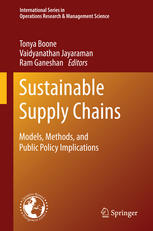

Most ebook files are in PDF format, so you can easily read them using various software such as Foxit Reader or directly on the Google Chrome browser.
Some ebook files are released by publishers in other formats such as .awz, .mobi, .epub, .fb2, etc. You may need to install specific software to read these formats on mobile/PC, such as Calibre.
Please read the tutorial at this link: https://ebookbell.com/faq
We offer FREE conversion to the popular formats you request; however, this may take some time. Therefore, right after payment, please email us, and we will try to provide the service as quickly as possible.
For some exceptional file formats or broken links (if any), please refrain from opening any disputes. Instead, email us first, and we will try to assist within a maximum of 6 hours.
EbookBell Team

4.7
106 reviewsA sustainable enterprise is one that contributes to sustainable development by simultaneously delivering economic, social and environmental benefits or what has been termed "the triple bottom line." While pursuing profit, socially responsible companies should be sensitive to the environment and uphold the rights of all the firm's stakeholders. This edited volume explores leading-edge ideas — both by academics and forward-thinking companies — to (re)design and market products, source, manufacture, and eventually distribute and recover or dispose of them in an environmentally, ecologically, and socially responsible way.
This edited volume is made up of fifteen chapters loosely grouped into clusters. After an introduction, chapter 2 shows the greenhouse emissions at various levels, from countries all the way to individual products. Chapters 3-7 each focus on an industrial sector and address issues specific to that industry, with chapter 7 presenting a case study on LEED certification of Miller Hall, home of the Mason School of Business where two of the authors (Tonya and Ram) work. Chapters 8-10 address product take back in the supply chain. Chapter 8 introduces e-waste and surveys what firms are doing to combat it. Chapter 9 provides an overview of existing take-back legislation and academic papers that have studied various research questions associated with them. Chapter 10 is a tutorial that addresses the problem of product disposition on a closed-loop supply chain: what should a firm do with a product return?
Chapters 11-15 address measurement, monitoring, decision-making, and reporting regarding environmental issues in a firm. Chapter 11 provides an academic survey of eco-labeling and the consumer’s willingness to pay for them. Chapter 12 discusses how firms can measure the total carbon footprint in their supply chains and some of the strategies they can use to mitigate carbon emissions. Using the price of call options, chapter 13 illustrates how managers can quanti